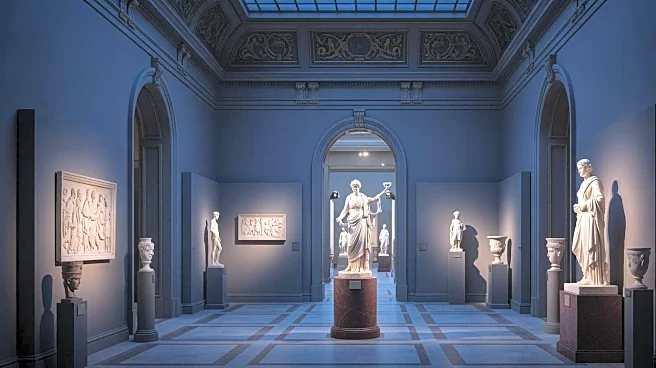What's Happening?
The British Museum has come under criticism from Greece for hosting a fundraising gala, known as the Pink Ball, in the Parthenon Marbles gallery. The event, which took place on October 18, was attended
by 800 guests, including high-profile figures such as Mick Jagger and Naomi Campbell. The gala aimed to generate new revenue streams for the museum amidst ongoing cuts to public funding. However, Greek authorities, led by Culture Minister Lina Mendoni, condemned the use of the Parthenon Marbles as 'decorative elements,' labeling the event as 'offensive.' This incident follows a previous controversy in 2024 when the museum hosted a fashion show by British label Erdem in the same gallery, which also drew criticism from Greece for disrespecting cultural heritage.
Why It's Important?
The controversy highlights the tension between cultural heritage preservation and the commercial use of historical spaces. The British Museum's decision to host events in the Parthenon Marbles gallery has sparked international debate over the ethics of using cultural artifacts for fundraising purposes. The backlash from Greece underscores the sensitivity surrounding the Parthenon Marbles, which have long been a point of contention between the UK and Greece. Additionally, the involvement of climate activists protesting the museum's ties with British Petroleum adds another layer of complexity, as cultural institutions face scrutiny over their funding sources. The incident may influence future policies regarding the use of cultural heritage sites for commercial events.
What's Next?
The British Museum may need to reassess its approach to hosting events in culturally significant spaces, especially given the strong reactions from Greece and environmental groups. The museum's ongoing partnership with British Petroleum could face further scrutiny, potentially leading to changes in sponsorship agreements. As public funding for museums continues to decline, institutions like the British Museum will likely explore alternative revenue streams, but they may need to balance financial needs with ethical considerations. The museum's response to the criticism and its future event planning will be closely watched by stakeholders in the cultural and environmental sectors.
Beyond the Headlines
The controversy raises broader questions about the commercialization of cultural heritage and the responsibilities of museums in preserving historical artifacts. It also highlights the growing influence of environmental activism in shaping public discourse around corporate sponsorships. The incident may prompt discussions on establishing ethical guidelines for museum partnerships and event hosting, ensuring that cultural heritage sites are respected and preserved for future generations.








